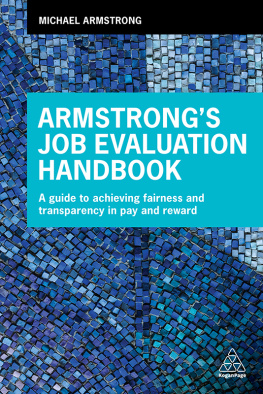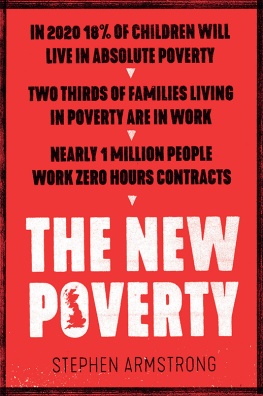The New Poverty
The New Poverty
Stephen Armstrong
First published by Verso 2017
Stephen Armstrong 2017
All rights reserved
The moral rights of the author have been asserted
1 3 5 7 9 10 8 6 4 2
Verso
UK: 6 Meard Street, London W1F 0EG
US: 20 Jay Street, Suite 1010, Brooklyn, NY 11201
versobooks.com
Verso is the imprint of New Left Books
ISBN-13: 978-1-78663-463-4
ISBN-13: 978-1-78663-466-5 (UK EBK)
ISBN-13: 978-1-78663-467-2 (US EBK)
British Library Cataloguing in Publication Data
A catalogue record for this book is available from the British Library
Library of Congress Cataloging-in-Publication Data
A catalog record for this book is available from the Library of Congress
Typeset in Fournier MT by Hewer Text Ltd, Edinburgh
Printed in the US by Maple Press
For Lyndsey Cameron Armstrong, in memory,
and for Helen Hawkins, in gratitude .
The object of government in peace and war is not the glory of rulers or of races, but of the happiness of the common man .
Sir William Beveridge, Social Insurance
and Allied Services Report , 1942
Contents
This book began with articles written for Unreported Britain a project run by the Orwell Foundation and the Joseph Rowntree Foundation in response to the breaking of the umbilical link between the centre and the regions and the absence of accurate, well-researched reporting from communities across the country. Jean Seaton at the Orwell Foundation and Abigail Scott Paul at the Joseph Rowntree Foundation invited me to take part and provided funding to cover extended periods of research. The Joseph Rowntree Foundations team of local activists proved the best possible source of stories. Janine Gibson and Harriet Sherwood at the Guardian and Jane Bruton and Christopher Hope at the Daily Telegraph commissioned the final pieces. Without them the book wouldnt exist.
Maruxa Ruiz del Arbol, my friend and colleague now sadly returned to El Pas , co-researched and co-wrote the first series of articles and helped define the mission. Leo Hollis at Verso had long-term faith and showed extreme patience for which Im exceptionally grateful. Cat Ledger, my excellent agent, was equally forbearing. Mark Martin and Dan Harding provided expert and necessary editing; Jim Carter proofread tirelessly, and Alan Rutter indexed order out of chaos. Thank you all and thank you. Stephanie Le Lievre at the Orwell Foundation sorted so many things out.
I was helped by an enormous number of people across the country some of them named in the book, some not. Particular thanks go to Malcolm Walker, Ian Cawley, Peter Gowland, Peter Robinson and Maxy Bianco in Hartlepool; Barbara Nettleton, Donna Hall, Rachel Stafford and Mike Ridell in Wigan; Daniel Flynn and his excellent team in Stoke-on-Trent; Jim McCormick, Alan McNiven, Annabelle Armstrong, Sharon McAulay and Emma Richardson in Paisley; David Farrell and Lesley Stewart in Glasgow; the diligent Jeremy Bailey, Mike Hutin and Rachel Howells in Port Talbot; Shona Alexander and John Wildman in Newcastle; Emma Pole, Richard Bellamy and James Grieve in Folkestone; Ian Wilson and Nick ODonovan in Wakefield; Lauri McCusker, Hazel Gardiner and Dermot Finlay in Fermanagh; Quintin Oliver in Belfast; Anwen Hughes; Anne Birkett from the Farmers Union of Wales; Hugh Milroy and his daughter Vicky in the Cotswolds; Lesley Smith and Victoria Winckler in Merthyr Tydfil; Rebecca Pawley, Anna Hiley and Wayne Henderson at Inclusion Healthcare; Miriam Holland in Leicester; Emily May in London; Luke Primarolo in Shirebrook; and Bob Wilson and Eileen Gallagher in Liverpool, as well as a number of people who preferred to remain unnamed.
I was also helped by the expertise of Lisa McKenzie, LSE; Rob Holdsworth and Natalie Cox at the Resolution Foundation; Dr Kingsley Purdam at the University of Manchester; Sam Royston and Faith Dawes at the Childrens Society; Liz Chinchen at Unison and Shaun Noble at Unite; Matthew Upton at the Citizens Advice Bureau; Aubrey Sheiham at UCL; Adrian Curtiss at the Trussell Trust; the Institute for Fiscal Studies; the Centre for Research on Socio-Cultural Change; Rachel Orr at Oxfam; Mike Parker at the Webb Memorial Trust; John Bibby and Haidee ODonnell at Shelter; Dr Martin Moore in the Policy Institute at Kings College London; and Cathy Bennett at Fingertips Typing.
Personal thanks go to Helen Hawkins, the best editor a journalist could have; Al Deakin, Simon Wilson, Ed Waller, Undaleeb Qazi, DVN and Sandra Forde; Ken and Jill Coles and their family for immense generosity; Clare Birchall for helping me find my way forward; my family for hanging on during the worst year of our lives; and to Rosa and Tess for making everything brilliant again.
The Plan for Social Security is put forward as part of a general programme of social policy. It is one part only of an attack upon five giant evils: upon the physical Want with which it is directly concerned, upon Disease which often causes that Want and brings many other troubles in its train, upon Ignorance which no democracy can afford among its citizens, upon the Squalor which arises mainly through haphazard distribution of industry and population, and upon the Idleness which destroys wealth and corrupts men .
Sir William Beveridge, Social Insurance
and Allied Services Report
The 1942 Beveridge Report is the closest thing to a British national holy book. It changed the country fundamentally and many of us, myself included, would not be alive today had the eccentric and patrician Sir William Beveridge not zealously pursued his simple brief to undertake, with special reference to the inter-relation of the schemes, a survey of the existing national schemes of social insurance and allied services, including workmens compensation, and to make recommendations.
Initially, Beveridge took on the assignment rather grudgingly. He had an unusual portfolio of jobs and views by the time he started. The son of a Scottish judge in the Indian civil service, he had worked as a lawyer, before joining the anti-poverty charity and social welfare centre Toynbee Hall, in Whitechapel, to study the causes and cures of poverty.
When the Second World War began, he had hoped to play a central part organising the nations manpower, but was put in charge of an obscure interdepartmental inquiry into the coordination of the social services. He accepted the appointment unhappily but more than rose to the task.
When he presented his Social Insurance and Allied Services Report , he intended to tackle the Five Giants of want, disease, ignorance, squalor and idleness with a comprehensive programme of social change. First among these, he said, was want. Giving people enough money to live on, he argued, was the foundation for a good life. Health, education and sanitation could not be improved without it. This sentiment became the bedrock of the welfare state with most of his recommendations passed into legislation under a series of acts across 1946 and 1947.
Beveridge was, in certain respects, an unlikely social reformer. He got to know Fabian socialists Sydney and Beatrice Webb at Toynbee Hall, who helped shape his thinking on social reform and eugenics. He spent the pre-war years arguing that men who couldnt work should be supported by the state in return for a complete loss of all rights as a citizen, including the franchise and fatherhood. He was also far from a socialist his political and economic thinking moved back and forth between free market liberalism and a reformist state throughout his life.














